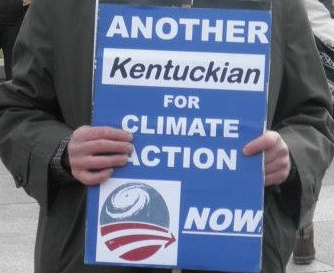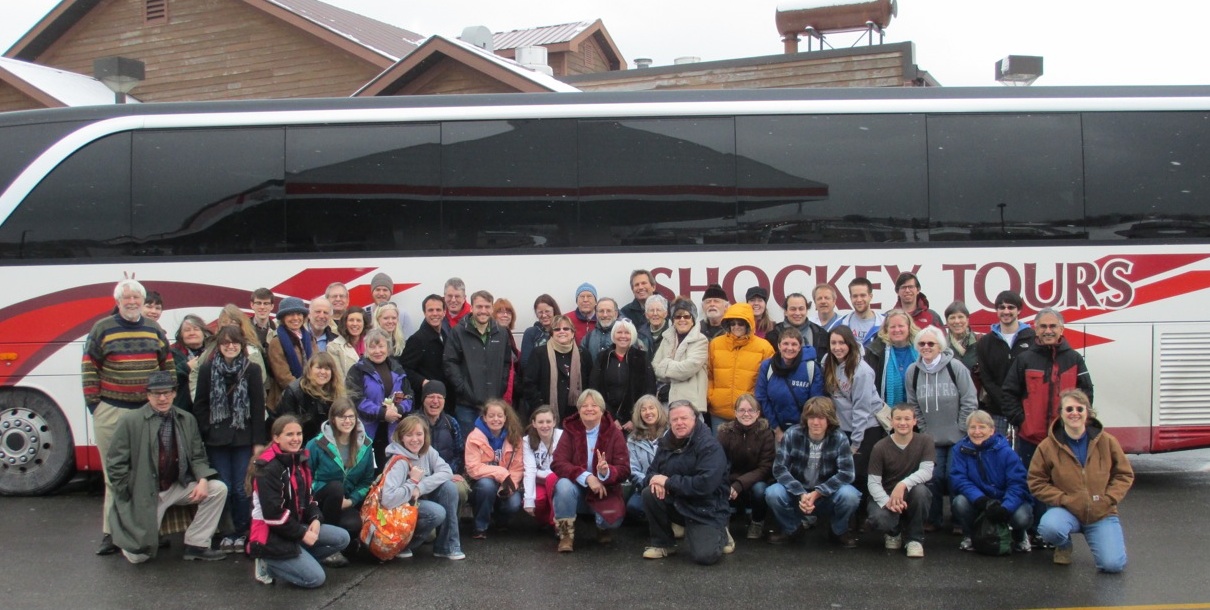A Dream Alive: Finding Our Voice on Climate Change
by Patricia Tull | February 22, 2013

On February 17, 2013, religious scholar Patricia Tull participated in the historic Forward on Climate rally in Washington, D.C. organized by 350.org and The Sierra Club. She was one of 54 riders on a bus from Kentucky that New Dream sponsored to help people attend the event, and shared the following reflections.
Aldo Leopold wrote more than 60 years ago, “One of the penalties of an ecological education is that one lives alone in a world of wounds.”
I wonder what he would have thought to see the over 40,000 Americans who gathered by the White House on Sunday to call for greater U.S. action on climate change. It was the nation’s largest gathering for ecological sanity ever—a crowd amassed to shine light on the Earth’s wounds, to help try to save life as we know it.
Yet it was only one-fifth the crowd that marched on Washington half a century ago, when the Rev. Martin Luther King shared his dream for racial equality.
Is this success? Or is it too few, too late? Will this crowd continue to grow, large enough, fast enough? Will we, and all others who research, and argue, and organize, and teach, and lobby, and invent, and farm, and fund, and write legislation, and create new business practices, and imagine new community structures, remember these days proudly? Will we relish them, as aging pastors now relish their Freedom Rides? We’ll see.
The Forward on Climate rally was a multicultural, multiracial, multigenerational moment. It was also a multistate effort, with groups like the Center for a New American Dream stepping up to help make the bus I took from Kentucky possible and even affordable. The 54 of us (plus 19 more in accompanying cars) ranged from 12 years old to, well, old enough to have been rallying for the past half century.
We were students, teachers, writers, retirees. Some had never been to D.C. Others were pros, boasting arrest records from more daring protests. Some had never marched. Others came straight from an I Love Mountains event in Frankfort to protest mountaintop removal coal mining. Rolling out of a Lexington parking lot Saturday at dawn, we introduced ourselves briefly, and left the rest for conversations en route.

Fast forward to Sunday afternoon, when several of us were shivering happily a stone’s throw from the stage. At 11:30 that morning, we had wondered where everyone was. By noon, the crowd was thick from Constitution Avenue to the Washington Monument. Some carried wooden windmills. Others wore polar bear hats or gas masks, or carried signs saying “Don’t be a fossil fool” or “There is no planet B,” or simply “Forward on Climate.”
Much was said from the stage as well. Here are some of the highlights: [Watch video.]
- The Rev. Lennox Yearwood, president of the Hip Hop Caucus, compared this march to the 1963 March on Washington, saying, “They were fighting for equality; we are fighting for existence.”
- Bill McKibben, the founder of 350.org, noted: “We shouldn’t have to be here—science should have decided our course long ago. But it takes a movement to stand up to all that money.”
- Chief Jacqueline Thomas, past Chief of the Saik’uz First Nation in British Columbia, Canada, emphasized the damage to communities, lands, and waters in the tar sands region where oil is being extracted, harm that “can no longer be Canada’s dirty secret.”
- Senator Sheldon Whitehouse of Rhode Island spoke of Congress sleepwalking through the climate crisis, calling President Obama a man “who has found his voice on climate change.” He continued, “We are going to help Barack Obama win this fight and make this right...and we are going to look down the hallways of history and say, ‘Yes we did!’”
- Van Jones, the former green jobs czar, said more forebodingly that if the Keystone XL pipeline from Canada to the United States goes through—a massive, carbon-rich project that the President can reject with a stroke of his pen—the first thing it will run over will not be farm lands, but Obama’s credibility: “Keystone is the only presidential decision anyone will care about in 20 years.”
These were as close as the speakers came to Dr. King’s melodious speech. But in a nation now saturated with strategic sound bites, clarion calls come in other ways. If the voices of thousands of scientists don’t sound clearly enough for American ears, perhaps nature’s many thunderous warnings will—derecho and drought, fire and flood, torrent and tornado, Sandy and snowstorm.
Before the rally, four of us had visited the MLK Memorial at the Tidal Basin on the Washington Mall. I told my 12-year-old friend Abigail that I hoped she would recall this day as proudly to her grandchildren as those who marched in 1963 have to theirs. What Dr. King once dreamed is now engraved in stone, and in hearts: “The end we seek is a society at peace with itself, a society that can live with its conscience.”
I thought about my math teacher in Austin, Texas, who shared with Dr. King nothing but the mutual name “Luther,” who, on April 5, 1968 [the day after King's assassination], rejoiced out loud to 30 horrified eighth graders, black and white, saying he got what he deserved. I wondered if Mrs. Luther lived long enough or well enough to repent.
But perhaps it’s enough that history is outliving her. What a world we have come to now—where an African-American pastor [Rev. Yearwood] can call this moment more critical than that historic moment before his birth that altered his life’s path. What a world, where an African-American activist [Van Jones] can challenge an African-American president to live up to inaugural words. If longstanding bigotries can change, unleashing powerful lives, then surely we can change our mundane fuel sources.
On the ride home, before drifting off to our own dreams, several suggested news headlines they hoped to see, mostly along the lines of “The Power Shifts,” as Bill McKibben pungently puts it. In a bus filled with passionate environmental advocates, it was easier to hope. I pray this hope grows and spreads, and that tomorrow’s ecologists will live in a world healed of its many wounds, where we know the value not only of all humans but of all creation.
Patricia Tull is A.B. Rhodes Professor Emerita of Old Testament at Louisville Presbyterian Seminary and lives in Jeffersonville, Indiana. She is an ordained Presbyterian minister with advanced training in preaching as well as Hebrew Bible, and she often teaches pastors, lay leaders, and church groups.

